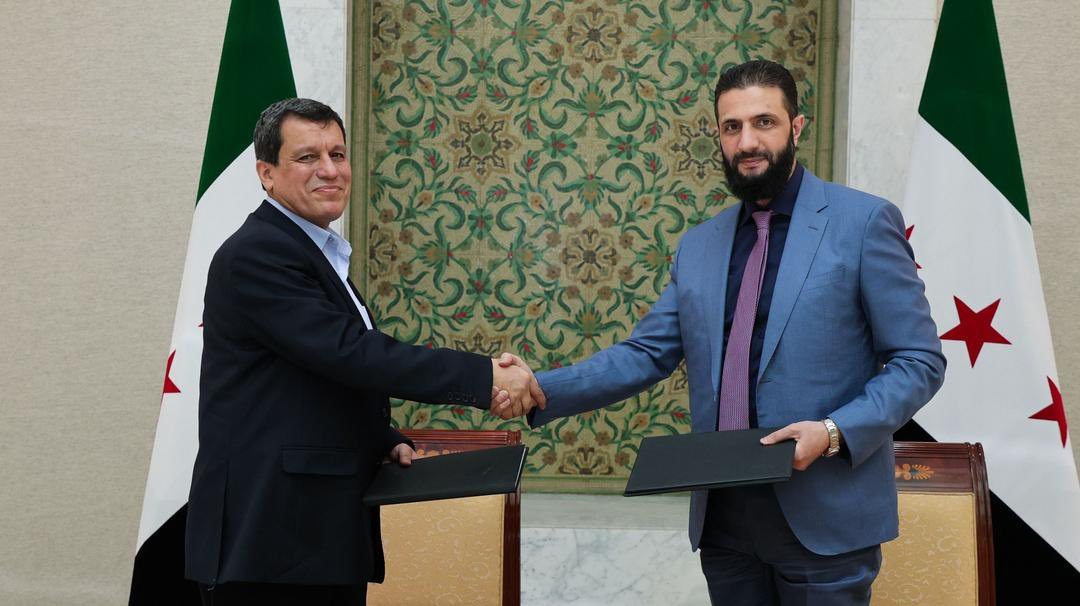New Round of US-Backed SDF–Damascus Talks Set to Define Future of Northeast Syria

A delegation from the Kurdish-led administration in northeast Syria is reportedly heading to Damascus, with Syria TV suggesting the visit could begin as early as today, to launch a new round of negotiations with the Syrian government. The talks are taking place amid coordinated logistical arrangements with the US-led international coalition and will focus on clarifying the terms of the agreement signed in March between Syrian President Ahmad al-Sharaa and SDF Commander Mazloum Abdi.
Context: The delegation has been tasked with addressing what one Kurdish official described as “complex files,” chief among them the clauses of the March 10, 2025 agreement between President al-Sharaa and Abdi. A Kurdish official clarified that this delegation is not authorized to negotiate Kurdish national or political rights; a separate delegation will be formed to engage on those matters, based on a “shared political vision document.”
The current talks are expected to focus on the future of the Self-Administration’s civil and security institutions, their potential integration into the Syrian state, as well as issues related to education, management of natural resources, and the administrative status of northeastern Syria.
The delegation reportedly includes several prominent figures from across North East Syria’s political and institutional spectrum. Among them are Fawza Youssef, a senior member of the PYD; Abd Hamid al-Mahbash, head of the Future Syria Party; Ahmad Youssef, co-chair of the Financial Committee; Sinjab Barsoum, head of the Syriac Union Party; and Sozdar Haji, a representative of the Women’s Protection Units (YPJ). Maryam Ibrahim and Yasser Sulaiman are also part of the delegation, serving as its official spokespersons.
Analysis: These renewed discussions follow a series of meetings between Turkish officials and both the Trump administration and the Syrian government. The March agreement consisted largely of vague general terms and declarations of intent rather than concrete commitments. A major point of contention concerns the nature of SDF integration into the Syrian army, with the SDF insisting on joining as a unified bloc while maintaining its role as protector of northeast Syria within a decentralized framework. The Syrian government and Turkey reject this arrangement, demanding that SDF members integrate individually.
Another contentious issue, should decentralization proceed, involves determining which areas would be included and whether Arab-majority Sunni regions—many of whose residents have affinity with Damascus’s new Sunni Arab leadership—would remain part of a decentralized zone despite currently being under SDF control.
Much depends on technical details, as the broad framework has already been agreed upon. The challenge lies in implementation, given that each side interprets the agreement’s implications differently. The Trump administration appears significantly more willing to collaborate with Turkey on Syrian affairs than previous administrations, with Trump appointing a close ally to oversee both Turkish and Syrian portfolios, seemingly viewing Syria policy through a Turkish lens.
Al-Sharaa’s diplomatic rehabilitation and high-level meetings with Trump, Crown Prince Mohammed bin Salman, and Erdogan, along with his government’s direct engagement with Israel, which has led to reduced Israeli airstrikes in Syria, may have strengthened his position relative to the SDF, though it has also made his situation more precarious.
Trump clearly seeks to substantially withdraw from Syria, delegating American influence to Turkey and potentially Saudi Arabia (as Ambassador Barrack indicated, emphasizing “regional solutions”). However, the administration will likely pursue arrangements that also benefit the Kurds without completely abandoning them. With the US already collaborating with the new Syrian government to resolve the al-Hol camp by repatriating Syrians and Iraqis who comprise roughly 90% of its population, the US-led anti-ISIS mission may be gradually concluding.
Importantly, this connects to the PKK situation within Turkey, where the organization has decided to disarm and engage in civilian politics. The ultimate SDF solution might involve scaled-back decentralization that excludes Arab areas in Raqqa and Deir Ezzor, potentially making the decentralized region geographically non-contiguous and requiring separate treatment of the SDF’s Arab and Kurdish components. However, outcomes will largely depend on the US position and ongoing American-Turkish coordination on this issue.









